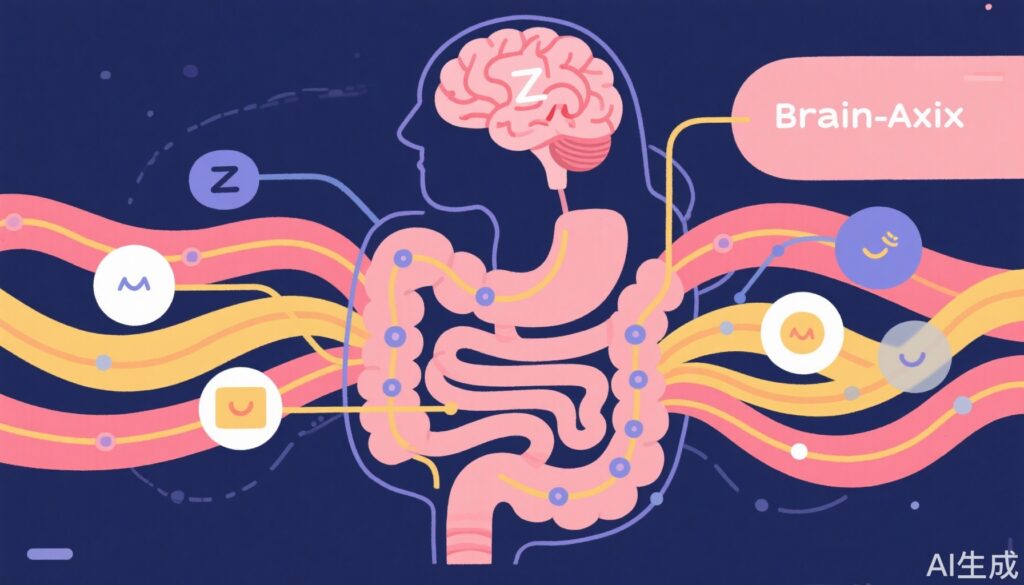Study Background and Disease Burden
Sleep disturbances and gastrointestinal (GI) disorders are both pervasive health issues that significantly impact quality of life and healthcare utilization worldwide. While conditions such as irritable bowel syndrome (IBS), inflammatory bowel disease (IBD), and other functional GI disorders affect millions, sleep-related problems—including insomnia, sleep disorders, and reduced sleep duration—are also widely prevalent. Although clinical observations have suggested a connection between GI diseases and poor sleep quality, the underlying relationships, potential mediating factors, and the extent of these associations have remained inadequately defined. Depression, a common comorbidity in both GI disorders and sleep disturbances, is increasingly recognized as a critical factor potentially linking these two domains. Understanding these interactions holds clinical relevance, as it may inform more comprehensive approaches to improving patient outcomes through integrative management of physical and psychological health components.
Study Design
This investigation utilized data from the 2005–2014 U.S. National Health and Nutrition Examination Survey (NHANES), a representative epidemiological resource, to examine associations between GI diseases and several sleep-related outcomes. The NHANES dataset included relevant information on GI diagnoses, sleep trouble, sleep disorders, sleep duration, depressive symptoms, and various demographic and clinical covariates.
Multivariable logistic regression models were employed to assess the adjusted odds ratios (ORs) relating GI diseases to self-reported sleep trouble and diagnosed sleep disorders. Linear regression estimated differences in sleep duration. To mitigate confounding and ensure model robustness, multicollinearity was evaluated using variance inflation factors, and sensitivity analyses were conducted.
Additionally, mediation analyses were performed to assess whether depression partially mediated the relationship between GI diseases and sleep outcomes—specifically sleep trouble, sleep disorders, and sleep duration—using appropriate statistically established mediation frameworks. Subgroup analyses evaluated the consistency of findings across populations stratified by hypertension status, diabetes, smoking history, coronary artery disease, and DI-GM scores, a measure relevant to GI health.
Key Findings
The large NHANES cohort analysis revealed that individuals with GI diseases had significantly higher odds of experiencing sleep disturbances than those without GI conditions. Fully adjusted logistic regression showed:
– An increased propensity for sleep trouble (adjusted OR = 1.70; 95% CI: 1.41–2.05; P < .001).
– Heightened odds of sleep disorders (adjusted OR = 1.80; 95% CI: 1.34–2.41; P < .001).
Moreover, a modest but statistically significant reduction in sleep duration was observed (adjusted β = –0.15 hours; 95% CI: –0.29 to –0.01; P = 0.038).
These associations remained consistent and statistically significant across diverse subgroups, including individuals without hypertension, without diabetes, nonsmokers, those with coronary artery disease, and those with higher DI-GM scores, underscoring the robustness and generalizability of the findings.
Mediation analyses further identified depression as a partial mediator in these relationships:
– Depression mediated the association between GI diseases and sleep trouble (Effect = 0.023; 95% CI: 0.022–0.035; P < .01).
– It also partially mediated the link between GI diseases and sleep disorders (Effect = 0.010; 95% CI: 0.008–0.014; P < .01).
– Depression mediated the association with reduced sleep duration as well (Effect = –0.126; 95% CI: –0.248 to –0.050; P = 0.040).
Mediation effects withstood sensitivity analyses, confirming their stability and suggesting that depressive symptoms represent an important intermediary pathway through which GI diseases influence sleep quality and duration.
Expert Commentary
Dr. Jatin Roper, a gastroenterologist and associate professor at Duke University, emphasizes the increasing recognition of gut-brain interaction (GBI) and the disorder of gastrointestinal-brain interaction (DGBI) as central to understanding these comorbidities. The brain-gut axis—via neural pathways like the vagus nerve, neuroendocrine signaling, immune responses, and the gut microbiome—integrally connects GI function and central nervous system processes.
Dr. Roper notes that many sleep disturbances are centrally mediated and thus could be mechanistically linked with GI disorders through dysregulated signaling within the gut-brain axis. The partial mediation by depression aligns with current knowledge that depression correlates strongly with both sleep problems and DGBI, supporting the biological plausibility of these findings.
Despite these insights, Dr. Roper observes a gap in clinical practice: many GI specialists do not routinely inquire about patients’ sleep disturbances, and likewise, sleep specialists may overlook GI symptoms. This study highlights the need for comprehensive, multidisciplinary evaluations and integrated care pathways tailored to overlapping GI and sleep disorders.
While robust, the observational nature of the study limits causal inference. Further longitudinal and interventional research is necessary to delineate temporal relationships and causal mechanisms and to develop targeted treatments addressing this triad of GI disease, depression, and sleep disturbance.
Conclusion
This analysis of NHANES data provides compelling evidence that GI diseases are significantly associated with increased sleep disturbances, including both subjective trouble and objective sleep disorders, alongside reduced sleep duration. Depression partially mediates these associations, indicating a complex interplay within the gut-brain axis involving psychological health.
Clinically, these findings underscore the importance of a holistic approach that integrates psychological assessment and management in patients presenting with GI complaints and sleep issues. Multidimensional interventions addressing gastrointestinal symptoms, mental health comorbidities, and sleep quality may improve overall patient outcomes.
Future research must focus on elucidating causal pathways and testing multidimensional treatment strategies through well-designed clinical trials. Such approaches may foster innovative therapies targeting the interconnected mechanisms linking gut health, mental health, and sleep regulation.
References
Ye S, Sui L, Zeng X, Dong Z, Liao Z, Qu C. Association between gastrointestinal disorders and sleep-related problems: the mediating effect of depression. BMC Gastroenterol. 2025 Aug 19;25(1):600. doi: 10.1186/s12876-025-04180-8. PMID: 40830850; PMCID: PMC12366357.



